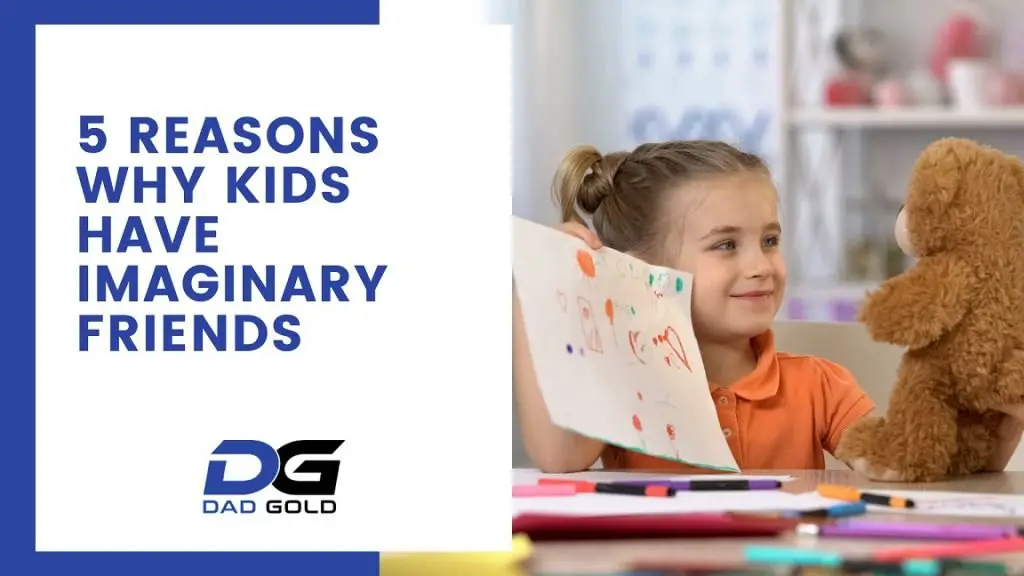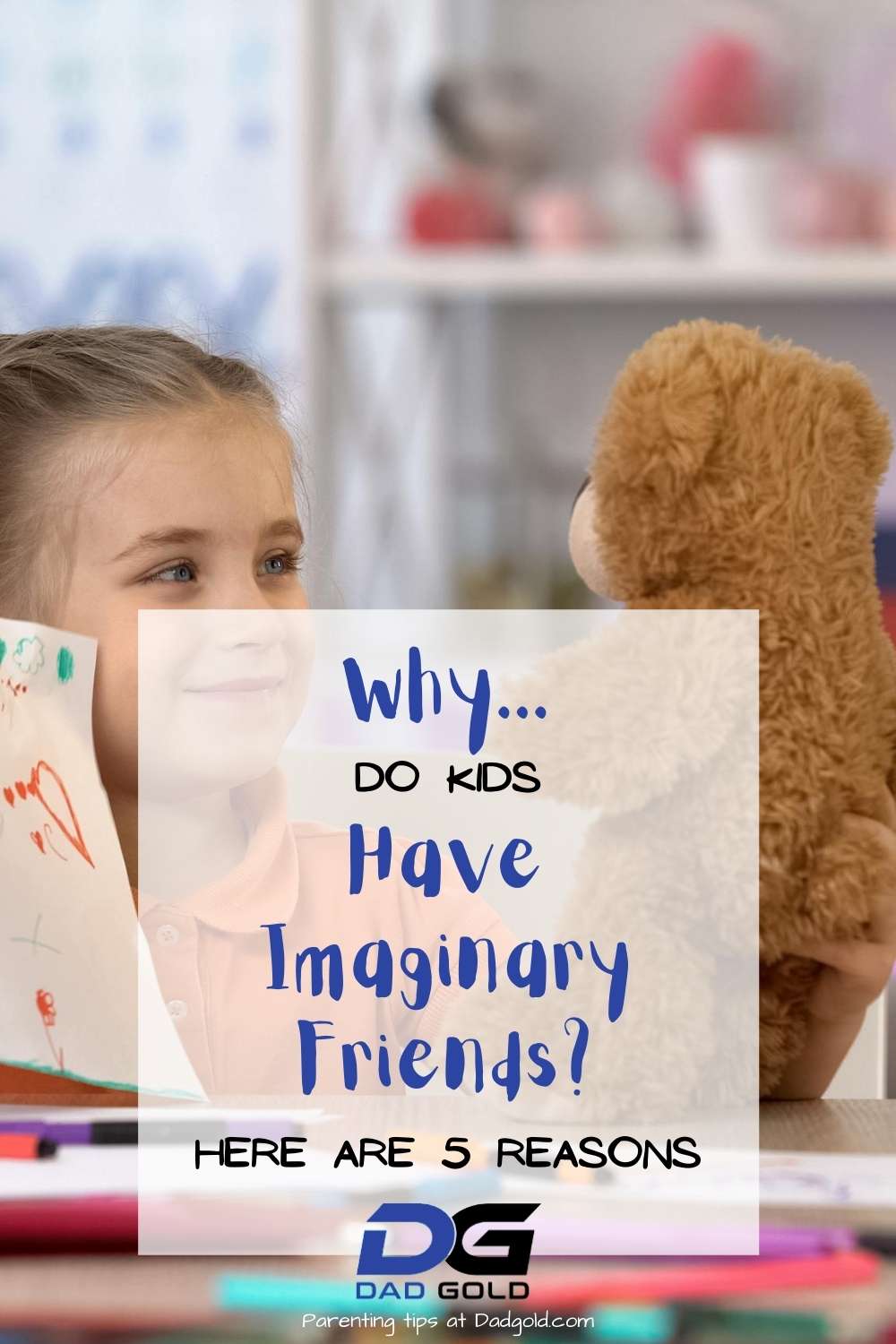I wish I had the imagination of a child! Sometimes, during playtime with my son, I get lost. I can’t keep up with the imagination flowing through his mind while mine freezes. Imagination is an awesome thing. Part of a child’s development might include an imaginary friend. Usually, this is nothing to worry about. In fact, it means you can get on with some grown-up tasks while your kid plays with their imaginary friend! Why do kids have imaginary friends? Let’s take a look at 5 reasons why…
What you will learn in this post:
- Why do kids have imaginary friends?
- When it is time to worry about your child’s imaginary friend
- Frequently asked questions

Why Do Kids Have Imaginary Friends – 5 Reasons Why
Why do kids have imaginary friends? Let’s take a look at these 5 common reasons:

More Playtime Fun
Why do kids have imaginary friends? The answer is probably this…
They are fun to play with!
Kids develop imaginary friends as part of their imagination. Not only does it mean they are creative enough to design an imaginary friend, but they also have the imagination to get through an entire playtime with them!
I wish I still had that kind of imagination!
Someone To Blame
I call this one ‘dodging responsibility.’ Your child has created an imaginary friend so they can pass the responsibility for when your child is naughty.
-

Bold Male Pride – Baseball Trucker Cap Celebrating Masculinity
£18.00 Select options This product has multiple variants. The options may be chosen on the product page -

Dad Bod Appreciation Gift Mug
£14.00 Add to cart -

Dad Bod, Bad Jokes Structured Baseball Cap
£22.00 Select options This product has multiple variants. The options may be chosen on the product page
After all, you can’t punish someone if it isn’t their fault, can you?
By creating an imaginary friend, your child has backed you into a corner, and you need to be creative to get back out! My favorite trick is to pass responsibility back to your child.
Make them in charge of punishing the imaginary friend, and explain that if it happens again, you will need some answers from your child as to why their punishment is not working.
Stop Fear
Some children will create an imaginary friend to sit with them when they are scared.
For instance, if they fear the dark, then the imaginary friend will be there with them, so they do not feel afraid.
It seems like a good coping mechanism to me!
Lonely
Your child might be lonely, and that is why they have created an imaginary friend.
Let’s face it, in terms of a coping mechanism, it is a very good one. The imaginary friend will be a sounding board for your child.
You should keep an eye on this, especially if your child feels very lonely all of the time. Check-in with your child to see if they have any friends, and if they don’t, then take some steps to get your child more friends.
Help Problem Solving
Why do kids have imaginary friends? To help with problem-solving, of course!
As kids progress, they have to improve. It is the way of the world! Homework gets more difficult, and so does life.
Having an imaginary friend to help with problem-solving is an excellent way of dealing with problems.
I don’t know about you, but I discuss it in my head to try and find a solution when I have a problem. That is basically what your child is doing, but out loud.
Is It OK For A Kid To Have An Imaginary Friend?
Having an imaginary friend is usually nothing to be concerned about. This is a part of your child growing up and is a key part of their imagination kicking in.
There are times when you need to question whether or not an imaginary friend is a good thing, so let’s cover those times now…
Imaginary Friends – When To Worry
Here are the 4 times when you need to be concerned about your child having an imaginary friend.
Demanding
If your child has an imaginary friend they and are very demanding, then it is time to raise the levels of concern.
Sometimes, kids can use an imaginary friend to demand things and remove the responsibility from themselves.
Turn that into a positive by handing over responsibility back to your child. Ask them to deal with the demands of the imaginary friend. If they are demanding food, get your child to explain why it is not time to eat yet. If they demand new toys, ask your toddler to explain why they cannot have new toys whenever they want.
If your child has created an imaginary friend to dodge responsibility, then hand it back to them!
Being Naughty
Imaginary friends can be a target for all things bad, which is a challenging issue to resolve.
If your child has an imaginary friend that is always getting the blame for all things naughty, such as:
- Drawing on the walls
- Breaking things
- Slamming doors
…then, you should discuss what is right and wrong alongside your child. Push the responsibility of punishing the imaginary friend onto your child to see how they deal with the problem.
Spending Too Long With Them And Not With Friends
Another concern that you may have is that your child is spending far too long on their own with their imaginary friend and doesn’t like interacting with real kids.
By spending time away from real people, it inhibits the development of their social skills.
You can resolve this by inviting their friends around to play or arranging play dates.
If They Are Scary
Kids have a tremendous imagination! I have trouble keeping up with my son during playtime… I guess my brain is getting too old. Unfortunately, this wild imagination also has some drawbacks, and this is one of them.
If your child has an imaginary friend, that’s cool. If the imaginary friend is always scaring them, then that isn’t cool.
The problem that you have is you can’t drive on over to the parents of the imaginary friend and discuss it with them; this is all happening in your child’s mind. What you should do, is sit down and break the news that the friend is not real. It would help if you also gave your child some ways to cope with the scary imaginary friend.
I’m going to get a bit deep here, but I am a huge fan of NLP (Neuro-Linguistic Programming). You can use this to teach your child not to fear their imaginary friend. You can begin by getting your child to close their eyes. Guide them by imagining their imaginary friend talking in a funny voice, dressing up as Micky Mouse, etc. Make it funny, and get them laughing. Tell them to picture their imaginary friend as a tiny person. These techniques will help your child to overcome the fear of an imaginary friend.
Frequently Asked Questions

When do kids stop having imaginary friends?
Usually, kids stop having imaginary friends at around the 7 or 8 years old stage. This is because there is a danger of them become a laughing stock at school if they have one. This is also the stage where they start to develop deeper friendships and the need for imaginary friends is reduced.
Is it OK for my child to go to school if they have an imaginary friend?
It depends on the age of your child. If they are 5 or 6, it is OK. There may be other kids in their class who also have imaginary friends. When your child gets to 7 or 8, it may result in bullying, so you should put a stop to it at around that age.
What do I do if my child blames their imaginary friend for things?
Your child may have created an imaginary friend to remove responsibility for their actions. I would turn that around and hand over the responsibility of punishing the imaginary friend. Then, if they are still blaming their friend, ask your child why their punishment isn’t working. Ask them to control their imaginary friend better, and coach them through it. Hand back the responsibility.
Conclusion
Why do kids have imaginary friends? I have identified the 5 most common reasons why on this page. Also, I have given you a few things to watch out for.
I said it earlier in this post, and I will repeat it. Imagination is an awesome thing, I wish it weren’t so difficult as an adult, but I guess that is our brains naturally slowing down as we age, right? That sucks…
Anyway, if your child has an imaginary friend, enjoy it while it lasts, but make sure it doesn’t last too long and doesn’t get in the way of their development.
Good luck!





